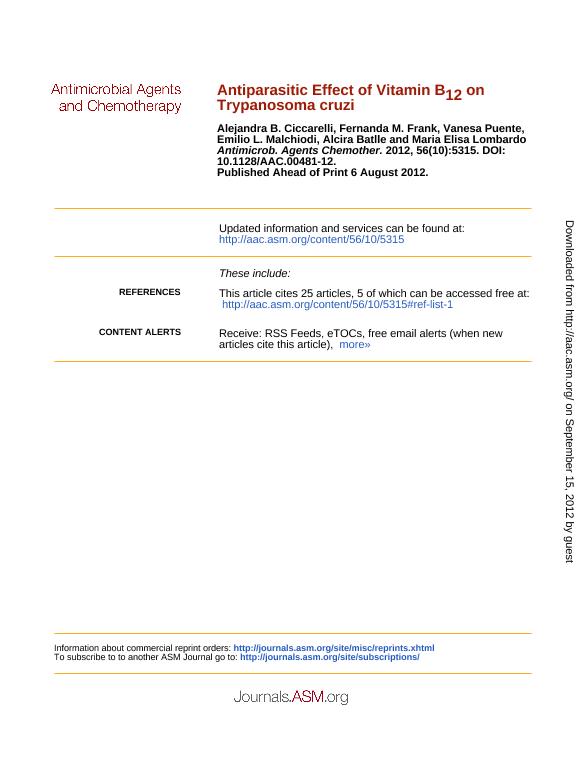Artículo
Antiparasitic effect of vitamin B12 on Trypanosoma cruzi
Ciccarelli, Allejandra Beatriz ; Frank, Fernanda María
; Frank, Fernanda María ; Puente, Vanesa Rocío
; Puente, Vanesa Rocío ; Malchiodi, Emilio Luis
; Malchiodi, Emilio Luis ; Batlle, Alcira María del C.
; Batlle, Alcira María del C. ; Lombardo, Maria Elisa
; Lombardo, Maria Elisa
 ; Frank, Fernanda María
; Frank, Fernanda María ; Puente, Vanesa Rocío
; Puente, Vanesa Rocío ; Malchiodi, Emilio Luis
; Malchiodi, Emilio Luis ; Batlle, Alcira María del C.
; Batlle, Alcira María del C. ; Lombardo, Maria Elisa
; Lombardo, Maria Elisa
Fecha de publicación:
10/2012
Editorial:
American Society for Microbiology
Revista:
Antimicrobial Agents and Chemotherapy
ISSN:
0066-4804
Idioma:
Inglés
Tipo de recurso:
Artículo publicado
Clasificación temática:
Resumen
A nutritional characteristic of trypanosomatid protozoa is that they need a heme compound as a growth factor. Because of the cytotoxic activity of heme and its structural similarity to cobalamins, we have investigated the in vitro and in vivo effect of vitamin B12 (or cyanocobalamin) on the different forms of Trypanosoma cruzi. Cyanocobalamin showed a marked antiparasitic activity against epimastigotes (50% inhibitory concentration [IC50], 2.42 μM), amastigotes (IC50, 10.69 μM), and trypomastigotes (IC50, 9.46 μM). Anti-epimastigote and -trypomastigote values were 1.7 to 4 times lower than those obtained with the reference drug benznidazole (Bnz). We also found that B12 and hemin do not interact with each other in their modes of action. Our results show that B12 increases intracellular oxidative activity and stimulates both superoxide dismutase (50%) and ascorbate peroxidase (20%) activities, while the activity of trypanothione reductase was not modified. In addition, we found that the antioxidants dithiothreitol and ascorbic acid increase the susceptibility of the parasite to the cytotoxic action of B12. We propose that vitamin B12 exerts its growth-inhibitory effect through the generation of reactive oxygen species. In an in vivo assay, a significant reduction in the number of circulating parasites was found in T. cruzi-infected mice treated with cyanocobalamin and ascorbic acid. The reduction of parasitemia in benznidazole-treated mice was improved by the addition of these vitamins. According to our results, a combination of B12 and Bnz should be further investigated due to its potential as a new therapeutic modality for the treatment of Chagas' disease. Copyright © 2012, American Society for Microbiology. All Rights Reserved.
Palabras clave:
Trypanosoma Cruzi
,
Antiparasitic Agents
,
Vitamin B12
,
Antioxidant Enzymes
Archivos asociados
Licencia
Identificadores
Colecciones
Articulos(CIPYP)
Articulos de CENTRO DE INVEST. SOBRE PORFIRINAS Y PORFIRIAS
Articulos de CENTRO DE INVEST. SOBRE PORFIRINAS Y PORFIRIAS
Citación
Ciccarelli, Allejandra Beatriz; Frank, Fernanda María; Puente, Vanesa Rocío; Malchiodi, Emilio Luis; Batlle, Alcira María del C.; et al.; Antiparasitic effect of vitamin B12 on Trypanosoma cruzi; American Society for Microbiology; Antimicrobial Agents and Chemotherapy; 56; 10; 10-2012; 5315-5320
Compartir
Altmétricas



